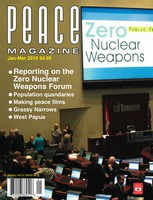
Peace Magazine Jan-Mar 2010, page 28. Some rights reserved.
Search for other articles by Judith Deutsch here
Yves Engler, The Black Book of Canadian Foreign Policy (Fernwood, 2008).
Jim Harding, Canada’s Deadly Secret: Saskatchewan uranium and the global nuclear system (Fernwood, 2007)
Government decisions inevitably affect people beyond national borders because such threats as climate change, financial breakdown, inequities of wealth, and nuclear war all have global impact. But foreign policy takes a back seat in Canadian electoral politics. Studies of Canadian history consistently reveal a picture of deception in which idealistic words like “responsibility to protect” conceal abusive practices.
Investigative studies often reveal heartbreaking treatment of people and their environment. Knowing the grim facts challenges feelings of national pride. Studies like Engler’s and Harding’s are unsettling because they reveal serious moral flaws in leaders, even revered leaders. Yet it is important to know the facts. Particularly in the areas of banking, extractive industries, trade, and military affairs, Canadian corporate and government leaders consistently make decisions that augment their own personal wealth and power and perhaps a narcissistic sense of “being one of the boys.” The Haitian crisis of 2005 is one example of Canadian leaders intervening primarily to please the US while having no regard for the wishes of the Haitian people.
The books cover historical antecedents as well as the current political and economic situation. A partial list of Harding’s topics include the uranium industry from the original side-stepping of aboriginal rights, to mining, the use of Canadian uranium in nuclear weapons and depleted uranium weaponry, nuclear waste, propaganda and secrecy, and hypocrisy. Engler’s book is organized by geographic area and shows that Canadian damage is worldwide. The two books are complementary in showing that the extraction industries increasingly influence the government.
Both authors write of Canada providing a major source of uranium for the atomic bombs dropped on Japan. Prime Minister Mackenzie King declared: “it gives me pleasure to announce that Canadian scientists played an important role, having been intimately connected, in an efficient manner, to this great scientific development”(Engler, p.52). After the war, the Canadian government told the public that it was developing nuclear technology only for non-military purposes while continuing to create weapons-grade plutonium for the United States.
Harding writes that until the 1970s, 90% of uranium from Saskatchewan went directly to the US for military uses. Canadian uranium supplied one-third of the 26,000 nuclear weapons in the United States’ post-World War II arsenal. This was supported in secret by the CCF/NDP provincial government under Tommy Douglas and by the federal government under Lester Pearson.
Engler documents a long history of hypocrisy, and opportunism. In 2007, Canadian foreign affairs minister Peter McKay said that “Canada is deeply concerned with the direction that Iran is headed. The regime in Tehran cannot be allowed to acquire nuclear weapons.” However, Canada was prepared to sell nuclear reactors to the shah of Iran. Canada has sold 29 nuclear reactors to foreign countries, primarily to dictatorships with poor human rights records: Pakistan and Taiwan in the 1960s, Argentina, South Korea and Romania in the 1970s, and China in the 1990s. In 1974 AECL even tried to sell a Candu reactor to Saddam Hussein, stating that a selling point was that the reactor could produce plutonium. Most nuclear exports have been financed in some way with aid dollars, from the Colombo Aid Plan to CIDA. Canada has aided Iran’s regional rivals Pakistan and India in their programs to build nuclear weapons, writes Engler: “Canada has changed its policy on nuclear non-proliferation to accommodate India’s entry to the club of countries that can trade openly in nuclear fuel and technology, despite its weapons programs….Canada’s opposition to nuclear warfare has never included curtailing the atomic bomb’s building blocks.”
Would history be different if members of the government were able to say no to the tar sands, to the selling of uranium for nuclear weapons, to the violent treatment of indigenous peoples and decimation of their environments by Canadian mining companies here and abroad? Many lives would not have been cut short. Possibly others would be emboldened to say no as well. These books point to the need to challenge corrupt authority and to understand what allows for such pathological leadership.
Reviewed by Judith Deutsch, a Toronto psychologist and president of Science for Peace.

Peace Magazine Jan-Mar 2010, page 28. Some rights reserved.
Search for other articles by Judith Deutsch here